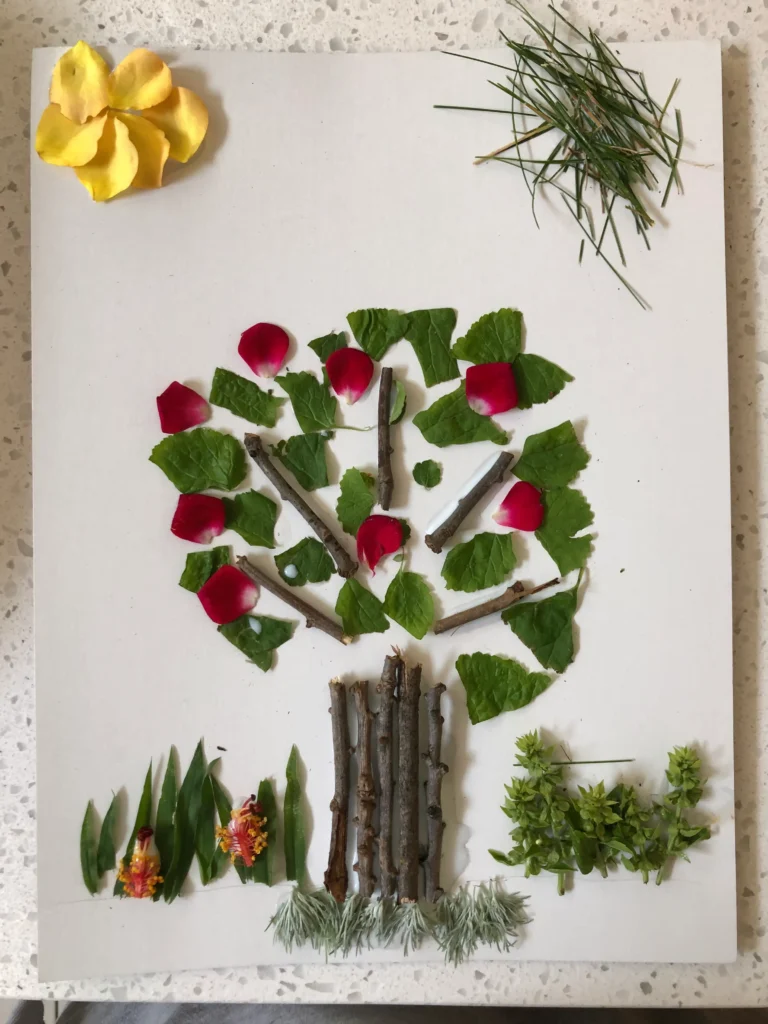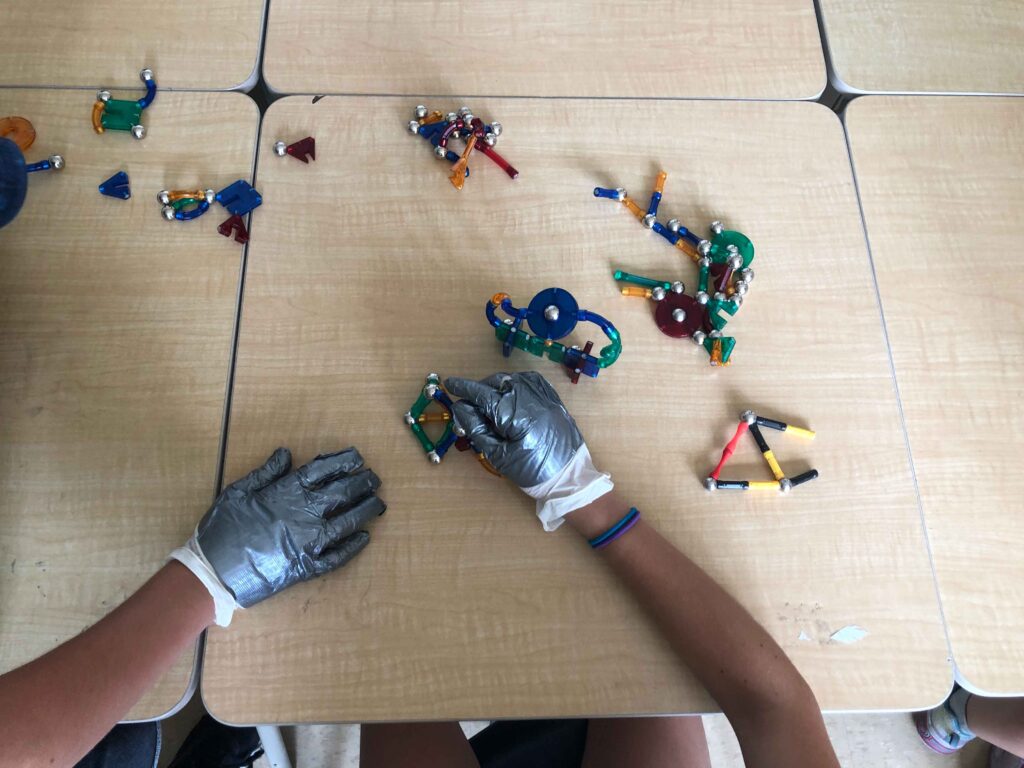Discovery of the Earth and the sky! A series of workshops designed especially for young curious minds. Get ready to embark on a captivating journey through the wonders of our planet and the mysteries of our solar system. During these hands-on workshops, children will explore natural phenomena such as volcanic eruptions or earthquakes, study the passage of time, and the significance of our solar system in our lives! Let’s take a new step towards understanding the forces that shape our environment and contemplate the immeasurable beauty of the universe.

Mummy, why do big heavy boats float but tiny little marbles sink in the water? It’s because of their shape and their composition! Here is a little experiment to explore these differences.
Why do large ships float while small beads sink? In this workshop, children dive into the world of material properties by discovering those that float and those that sink. They will categorize a variety of objects based on their shapes, compositions, or weights, formulate hypotheses, and test their flotation theories for each object. They will try to understand the concepts of buoyancy and density while developing their skills in observation and scientific reasoning. They will then take on the challenge of making items that sink float and vice versa. This workshop promises an educational and fun aquatic adventure for young participants.
Volcanic eruptions are generally disastrous: burning lava all the fumes that could be potentially deadly. Ours will be completely safe, if anything it will be artistic, innocent, and will guide us towards volcanism

Let’s transform into mini-volcanologists and build our own lava mountain! With homemade dough and a good dose of imagination, let’s decorate our volcano before making it erupt. Armed with flour, salt, and baking soda, let’s explore the hidden secrets behind volcanic eruptions. By observing the simulated magma spread, let’s discover the impacts on the surroundings. A secure adventure into the world of volcanoes not to be missed!
Fossils are the expression of the past, but nature takes thousands of years to make a fossil. In this experiment, we will speed up time and make fossils in a few minutes – fake ones of course! But we will understand how some of the real ones were formed.

Fossils are the expression of the past, but nature takes thousands of years to create one. Their extraction is also hard and laborious (but also rewarding). In this workshop, we will first excavate fossilized organisms from a “rock” and then speed up time to create fossils in a few minutes – fake ones, of course! These two experiments will give us a better appreciation of the work of paleontologists.
Seventy percent of the earth’s surface is covered with water, but less than 3% of it is drinkable. Filtering water allows us to use more of it. Let’s filter muddy waters to simulate natural and industrial filtration processes.
Join us for a hands-on experience where we filter water using gravel, sand, and other materials. Through this immersive activity, we explore the principles of science, technology, engineering, art, and mathematics (STEAM), while uncovering the process of water filtration and purification. By manipulating different materials and observing the results, we gain an understanding of concepts such as particle size, absorption, and filtration efficiency. This interactive experience promotes a deeper understanding of environmental science and encourages critical reflection on water conservation and purification methods.
Measuring time with water, sand or by observing a shadow? Yes, it is possible! Together, we will build instruments to measure time like people did thousands of years ago and try to calibrate it!

Let’s explore the ancient art of time measurement through fascinating and ancestral methods. By going back in time, we’ll uncover the origins of time measurement and its evolution over the centuries. Let’s delve into the history of timekeeping instruments, from sundials to fluid clepsydras. Through practical experiments, we’ll craft our own clepsydras to capture the passage of time as they did in antiquity.
Our planets are so pretty as they orbit around our brilliant sun! Let’s build a model of our solar system in 3D and make it as real as we can.

The planets of our solar system are beautiful, and our star, the sun, is shining! Let’s build a model of this solar system that is ours and in which we live. During this workshop, young explorers can bring our galaxy to life by creating our planets, our star, and other celestial bodies of their choice. They will learn about the appearance, positioning, and sizes of the planets in relation to each other. They will develop a practical understanding of key concepts in astronomy. This workshop promises to be an educational, playful, and memorable experience for our future budding
Am I trembling or is earth shaking under my feet?” said Ulysses in his epic adventure in the land of the cyclops. He could have known if it’s an earthquake had he done this experiment…
Let’s dive into the mysterious world of earthquakes by building our own seismograph! Inspired by the words of Ulysses during his journey among the Cyclopes, “Is it me trembling, or is it the ground quivering beneath my feet,” we delve into the science behind earthquakes. By constructing this instrument for detecting seismic movements, we uncover how scientists monitor and measure earth tremors. Let’s explore the dynamics of the earth and the nature of earthquakes.
What is the relationship between a seed and a plant? Where do the leaves or stems come from? What does a seed or a plant need to grow? Let’s see all this in a long, slow-paced experiment.

In this long-term experiment, children plant a seed and observe its development into a plant. They discover the origin of leaves and stems while exploring the essential needs of plants for their growth, such as water, air, light, and nutrients. This engaging activity provides a direct understanding of the connection between the seed and the mature plant, sparking curiosity about the plant growth process.
What do you want to do when you grow up? A lot of kids will say “Astronaut!” Let’s make our own space gloves and reveal some challenges in the professional life of an astronaut.

Let’s step into the shoes of aspiring astronauts by making our own astronaut gloves. Using simple materials and crafting techniques, let’s create large gloves similar to those used in space. Then, let’s take on the challenge of handling small objects with these gloves, discovering the difficulties and limitations astronauts face when working in space. This fun experience stimulates imagination and enhances understanding of life in space.